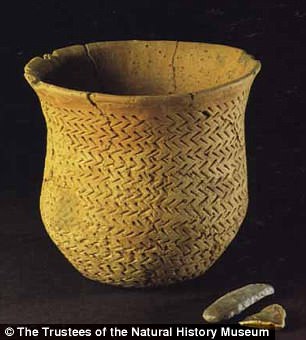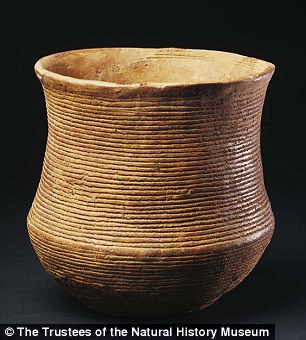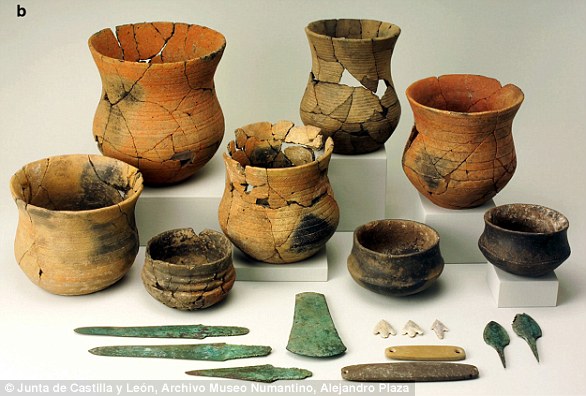The Romans may have left an impressive legacy of roads, irrigation and education in Britain but it was always thought they took their DNA with them when they left.
However, this theory could soon be overturned as researchers have found a strange genetic disparity in England during the Iron Age and Roman period.
By looking at ancient skeletons, scientists have found people in the south east of the country have DNA coming from elsewhere...
Roman soldiers may have left their genetic imprint on people living in South East England, claims DNA study
Researchers have found a strange genetic disparity in south east England
This could mean that some Romans who occupied Britain stayed after all
Researchers have looked at 1,000 skeletons to find out where DNA comes from
Most people's DNA at the time came from the fair-skinned Beaker People
However, some Britons at the time were also getting their DNA from elsewhere
By Phoebe Weston For Mailonline
12 April 2018
The Romans may have left an impressive legacy of roads, irrigation and education in Britain but it was always thought they took their DNA with them when they left.
However, this theory could soon be overturned as researchers have found a strange genetic disparity in England during the Iron Age and Roman period.
By looking at ancient skeletons, scientists have found people in the south east of the country have DNA coming from elsewhere.
This could mean that some Romans who occupied Britain from around 55AD to 410AD, most likely army veterans, stayed after all and started families - although the theory has yet to be proven.

The Romans may have left an impressive legacy of roads, irrigation and education in Britain but it was always thought they took their DNA with them when they left. However, new research suggests this may not be the case. Pictured are Romans invading England
Researchers at Harvard University have been looking at 1,000 skeletons to find out where their DNA comes from, writes the Telegraph.
Most people's DNA at the time came from the fair-skinned Beaker People who came from Europe in 2750BC.
They replaced 90 per cent of the Neolithic farmers who built Stonehenge and had lived here for 1,500 years.
However, it seems Britons at the time were also getting their DNA from elsewhere.
'We see changed in ancestry in the south-east of Britain by the Roman period compared to 1000 years before,' lead researcher Professor David Reich said.
'This means that there must have been admixture into south-eastern Britain in the Iron Age or Roman period that did not affect the North to the same extent.

Most people's DNA at the time came from the fair-skinned Beaker People (pictured) who came from Europe in 2750BC
'However, we don't know the details of how this occurred and several explanations are possible.'
As well as the suggestion it could be Roman DNA, there are two other leading theories.
One is that a small group of people who built the Stonehenge survived the invasion of the Beaker People and continued to breed.
Another theory is that it could have been an unknown group migrating from Europe, according to the paper published in Nature.
Experts suggest that if the DNA does come from Romans it is most likely to have belonged to settled veterans who decided not to return home after discharge.
'If their results are due to settlement in the Roman period, the most likely source would be legionary veterans who decided not to return home after their discharge', said Professor Mark Robinson of Oxford University's School of Archaeology.
'Perhaps settled army veterans encouraged further migration the Rhineland and Gaul', he told the Telegraph.
Last months researchers found the Beaker People almost wiped out the Neolithic farmers who built the Stonehenge 5,000 years ago.

Experts suggest that if the DNA - which was found on ancient skeletons from the south east - does come from Romans it is most likely to have belonged to settled veterans who decided not to return home after discharge
WHEN DID THE ROMANS OCCUPY BRITAIN?
55BC - Julius Caesar crossed the channel with around 10,000 soldiers. They landed at a beach in Deal and were met by a force of Britons. Caesar was forced to withdraw.
54BC - Caesar crossed the Channel with 27,000 infantry and cavalry. Again they landed at deal but were unopposed. They marched inland and after hard battles they defeated the Britons and key tribal leaders surrendered.
However, later that year, Caesar was forced to return to Gaul to deal with problems there and the Romans left.
54BC - 43BC - Although there were no Romans present in Britain during these years, their influence increased due to trade links.
43AD - A Roman force of 40,000 led by Aulus Plautius landed in Kent and took the south east. The emperor Claudius arrived in Colchester with reinforcements. Claudius appointed Plautius as Governor of Britain and returned to Rome.
47AD - Londinium (London) was founded and Britain was declared part of the Roman empire. Networks of roads were built across the country.
75 - 77AD - Romans defeated the last resistant tribes, making all Britain Roman. Many Britons started adopting Roman customs and law.
122AD - Emperor Hadrian ordered that a wall be built between England and Scotland to keep Scottish tribes out.
312AD - Emperor Constantine made Christianity legal throughout the Roman Empire.
228AD - The Romans were being attacked by barbarian tribes and soldiers stationed in the country started to be recalled to Rome.
410AD - All Romans were recalled to Rome and Emperor Honorious told Britons they no longer had a connection to Rome.
Source: History on the net
Evidence for this theory came from a similar DNA analysis of 400 prehistoric skeletons, some from after Stonehenge and others born before it was created.
The genes of these ancient people provide enough clues to determine that Beakers travelled here from Holland and took over in a few centuries.
The creators of Stonehenge appeared Mediterranean, with olive-hued skin, dark hair and eyes.
The Beaker people may have killed off the ancient engineers behind Stonehenge by bringing the bubonic plague to Britain.


Left: A Beaker pot housed at the National Museum of Scotland. Right: 'All-Over-Cord' Beaker pot from Bathgate, West Lothian, Scotland. Beaker people replaced 90 per cent of the Neolithic farmers who built Stonehenge and had lived here for 1,500 years
WHAT IS BELL BEAKER CULTURE?
Between 4,700 and 4,400 years ago, a new bell-shaped pottery style spread across western and central Europe, and this period is called the 'Bell Beaker'.
The period received its name due to the pottery's distinctive bell-shaped beakers, decorated in horizontal zones by finely toothed stamps.
The decorated pots are almost ubiquitous across Europe, and could have been used as drinking vessels or ceremonious urns.
Believed to be originally from Spain, the Beaker folk soon spread into central and western Europe in their search for metals.
But the sheer variety of beaker artifacts across Europe has made the pottery difficult to define as coming from one distinctive culture.
A new study published in Nature suggests that the Beaker culture spread through Europe via two different mechanisms - the spread of ideas and migration.

Beaker-complex grave goods from La Sima III barrow, Soria, Spain. The set includes Beaker pots of the so-called 'Maritime style'
Dr Mike Parker Pearson, co-author of the study and professor of British later prehistory at University College London, said: 'Most of us have thought the people who built Stonehenge were our direct ancestors, but actually this study shows that they are only distantly related to us, if at all.
'We now realise these people had totally disappeared from the British population within 1,000 years.'
The Beakers were probably a peaceful people, with no evidence that they dispatched the Neolithic farmers by violent means.
Disease is the most likely reason for the Stonehenge creators' demise.

The Beaker people reached Britain around 4,500 years ago, and within 500 years, almost completely wiped out the original inhabitants. Researchers still aren't sure how this happened, but they suggest disease may be the cause, as the Beaker people were a peaceful population

The Beaker people may have killed off the ancient engineers behind Stonehenge (pictured) by bringing the bubonic plague to Britain
However, this theory could soon be overturned as researchers have found a strange genetic disparity in England during the Iron Age and Roman period.
By looking at ancient skeletons, scientists have found people in the south east of the country have DNA coming from elsewhere...
Roman soldiers may have left their genetic imprint on people living in South East England, claims DNA study
Researchers have found a strange genetic disparity in south east England
This could mean that some Romans who occupied Britain stayed after all
Researchers have looked at 1,000 skeletons to find out where DNA comes from
Most people's DNA at the time came from the fair-skinned Beaker People
However, some Britons at the time were also getting their DNA from elsewhere
By Phoebe Weston For Mailonline
12 April 2018
The Romans may have left an impressive legacy of roads, irrigation and education in Britain but it was always thought they took their DNA with them when they left.
However, this theory could soon be overturned as researchers have found a strange genetic disparity in England during the Iron Age and Roman period.
By looking at ancient skeletons, scientists have found people in the south east of the country have DNA coming from elsewhere.
This could mean that some Romans who occupied Britain from around 55AD to 410AD, most likely army veterans, stayed after all and started families - although the theory has yet to be proven.

The Romans may have left an impressive legacy of roads, irrigation and education in Britain but it was always thought they took their DNA with them when they left. However, new research suggests this may not be the case. Pictured are Romans invading England
Researchers at Harvard University have been looking at 1,000 skeletons to find out where their DNA comes from, writes the Telegraph.
Most people's DNA at the time came from the fair-skinned Beaker People who came from Europe in 2750BC.
They replaced 90 per cent of the Neolithic farmers who built Stonehenge and had lived here for 1,500 years.
However, it seems Britons at the time were also getting their DNA from elsewhere.
'We see changed in ancestry in the south-east of Britain by the Roman period compared to 1000 years before,' lead researcher Professor David Reich said.
'This means that there must have been admixture into south-eastern Britain in the Iron Age or Roman period that did not affect the North to the same extent.

Most people's DNA at the time came from the fair-skinned Beaker People (pictured) who came from Europe in 2750BC
'However, we don't know the details of how this occurred and several explanations are possible.'
As well as the suggestion it could be Roman DNA, there are two other leading theories.
One is that a small group of people who built the Stonehenge survived the invasion of the Beaker People and continued to breed.
Another theory is that it could have been an unknown group migrating from Europe, according to the paper published in Nature.
Experts suggest that if the DNA does come from Romans it is most likely to have belonged to settled veterans who decided not to return home after discharge.
'If their results are due to settlement in the Roman period, the most likely source would be legionary veterans who decided not to return home after their discharge', said Professor Mark Robinson of Oxford University's School of Archaeology.
'Perhaps settled army veterans encouraged further migration the Rhineland and Gaul', he told the Telegraph.
Last months researchers found the Beaker People almost wiped out the Neolithic farmers who built the Stonehenge 5,000 years ago.

Experts suggest that if the DNA - which was found on ancient skeletons from the south east - does come from Romans it is most likely to have belonged to settled veterans who decided not to return home after discharge
WHEN DID THE ROMANS OCCUPY BRITAIN?
55BC - Julius Caesar crossed the channel with around 10,000 soldiers. They landed at a beach in Deal and were met by a force of Britons. Caesar was forced to withdraw.
54BC - Caesar crossed the Channel with 27,000 infantry and cavalry. Again they landed at deal but were unopposed. They marched inland and after hard battles they defeated the Britons and key tribal leaders surrendered.
However, later that year, Caesar was forced to return to Gaul to deal with problems there and the Romans left.
54BC - 43BC - Although there were no Romans present in Britain during these years, their influence increased due to trade links.
43AD - A Roman force of 40,000 led by Aulus Plautius landed in Kent and took the south east. The emperor Claudius arrived in Colchester with reinforcements. Claudius appointed Plautius as Governor of Britain and returned to Rome.
47AD - Londinium (London) was founded and Britain was declared part of the Roman empire. Networks of roads were built across the country.
75 - 77AD - Romans defeated the last resistant tribes, making all Britain Roman. Many Britons started adopting Roman customs and law.
122AD - Emperor Hadrian ordered that a wall be built between England and Scotland to keep Scottish tribes out.
312AD - Emperor Constantine made Christianity legal throughout the Roman Empire.
228AD - The Romans were being attacked by barbarian tribes and soldiers stationed in the country started to be recalled to Rome.
410AD - All Romans were recalled to Rome and Emperor Honorious told Britons they no longer had a connection to Rome.
Source: History on the net
Evidence for this theory came from a similar DNA analysis of 400 prehistoric skeletons, some from after Stonehenge and others born before it was created.
The genes of these ancient people provide enough clues to determine that Beakers travelled here from Holland and took over in a few centuries.
The creators of Stonehenge appeared Mediterranean, with olive-hued skin, dark hair and eyes.
The Beaker people may have killed off the ancient engineers behind Stonehenge by bringing the bubonic plague to Britain.


Left: A Beaker pot housed at the National Museum of Scotland. Right: 'All-Over-Cord' Beaker pot from Bathgate, West Lothian, Scotland. Beaker people replaced 90 per cent of the Neolithic farmers who built Stonehenge and had lived here for 1,500 years
WHAT IS BELL BEAKER CULTURE?
Between 4,700 and 4,400 years ago, a new bell-shaped pottery style spread across western and central Europe, and this period is called the 'Bell Beaker'.
The period received its name due to the pottery's distinctive bell-shaped beakers, decorated in horizontal zones by finely toothed stamps.
The decorated pots are almost ubiquitous across Europe, and could have been used as drinking vessels or ceremonious urns.
Believed to be originally from Spain, the Beaker folk soon spread into central and western Europe in their search for metals.
But the sheer variety of beaker artifacts across Europe has made the pottery difficult to define as coming from one distinctive culture.
A new study published in Nature suggests that the Beaker culture spread through Europe via two different mechanisms - the spread of ideas and migration.

Beaker-complex grave goods from La Sima III barrow, Soria, Spain. The set includes Beaker pots of the so-called 'Maritime style'
Dr Mike Parker Pearson, co-author of the study and professor of British later prehistory at University College London, said: 'Most of us have thought the people who built Stonehenge were our direct ancestors, but actually this study shows that they are only distantly related to us, if at all.
'We now realise these people had totally disappeared from the British population within 1,000 years.'
The Beakers were probably a peaceful people, with no evidence that they dispatched the Neolithic farmers by violent means.
Disease is the most likely reason for the Stonehenge creators' demise.

The Beaker people reached Britain around 4,500 years ago, and within 500 years, almost completely wiped out the original inhabitants. Researchers still aren't sure how this happened, but they suggest disease may be the cause, as the Beaker people were a peaceful population

The Beaker people may have killed off the ancient engineers behind Stonehenge (pictured) by bringing the bubonic plague to Britain
Last edited: